Ellen and Jim Have a Blog, Too
We are two part-time academics. Ellen teaches in the English department and Jim in the IT program at George Mason University.


1996 A&E/Meridian _Emma_: "something odd going on with Knightley" · 24 March 08
Dear Harriet,
This week the PBS people aired Andrew Davies’ adaptation of Austen’s Emma (produced by Sue Birtwistle, directed by Diarmiud Lawrence, written by Andrew Davies, costumes Jenny Beavan). I hope however short and accompanied by but a few stills, some comments on the film might be appreciated by those who watched it last night.
The basic problem with this Emma is it’s so short; this makes it feel superficial since there is no time to develop any nuances or scenes at length. Davies is so intent on making sure we have action, outdoor scenes and his harvest close, that at every conceivable opportunity, scenes are placed outdoors, even when it is not all that probable. He also wants to express social criticism: he visualizes the economic arrrangements of the upper and lower classes, dramatizes the exploitative aspects of their interactions. So he invents scenes which could have occurred between the chapters of Austen’s book (this is often his technique). To do this in the time available Davies has to give up too much within the character and story development of the novel. This is the problem with all non mini-series adaptations. They end up suggesting scenes and alluding to others they could do, if only they had the time.
There is something going on there which no one has mentioned who analyzes it—though I note Mrs Elton (otherwise known as Diana Birchall) on one of the Austen blogs commented Mr Knightley (Mark Strong) is so fierce, so angry. Not only does Davies make Mr Martin (Alistair Petrie) and Mr Knightley far more central to the story’s development compared to Emma (Kate Beckinsale), Harriet (Samantha Morton), and Jane Fairfax (Olivia Williams), Mark Strong is presented as (how shall I put it) capable of becoming abusive. He is never soft or tender with Emma until the end, and then he is condescending. He snarls. He is endlessly ferocious, on the edge of an explosion, and then moves into unexplained furies.
This is a quite a contrast to the 1972 Emma where John Carson as Knightley and Doran Goodwin as Emma are friends, congenial, and their debates are fully aired and brought together for a genuine resolution in ironic comical romance when the book’s crisis scenes (as when Emma has Harriet refuse Mr Martin or insults Miss Bates) are over. In Davies’ 1996 Emma, when Emma insults Miss Bates (Prunella Scales), Mark Strong actually pushes Kate Beckinsale roughly, he bends her elbow and shoves her into the carriage. It’s not a coincidence that Strong played the torturer in Syriana and also plays hard macho men in other films.
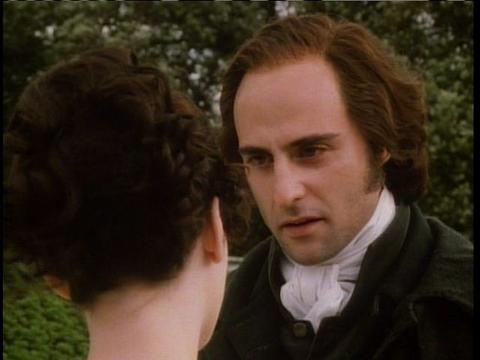
A somewhat less fierce moment, a startled Mr Knightley looks to see if Emma will say yes
Emma herself is made into someone relatively powerless and Kate Beckinsale’s acting is kept flat while Samantha Morton is presented as nervously susceptible to the slightest bullying.
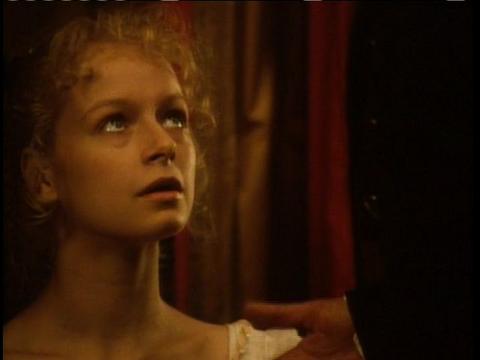
Samantha Morton as Harriet looking up to Mr Knightley at the painful Crown Ball
Luckily, this Harriet gets the one male who is protective in the film, Mr Martin.
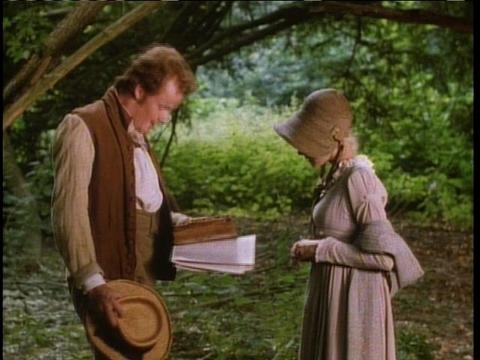
Davies’ Mr Martin (Alistair Petrie) has gotten a book Miss Smith recommended; he is all gentleness with her. When Austen’s Mr Martin encounters Miss Smith on her walk, he has to admit he has forgotten to obtain Ann Radcliffe’s The Romance of the Forest or Maria Regina Roche’s The Children of the Abbey.
I suggest too that Davies’ Emma lacks an inner life. It will be said that’s conveyed by the dreams; but these are caricatures. It’s not just Kate Beckinsale’s complacency of expression (sometimes she’s vexed), we are given no inner scene of language which is nuanced. I feel the film lacks an inner life because Davies not interested in Emma’s inner life for real.
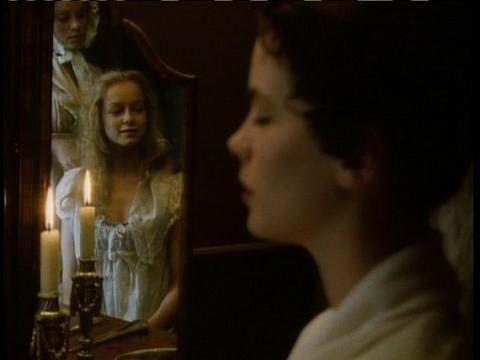
Typical Emma moment: she not only dreams of others ludicrously, she doesn’t see herself in the mirror nor the woman Harriet actually is
Davies attempts to break out of the female perspective by projecting the disquiet about Frank (Raymond Coulthard) we find in Austen’s novel and adding to that, an interpretation of Austen’s Mr Knightley which turns his saturnine Darcy moments in Austen’s text into a hot-tempered semi-alienation from the film’s princess heroine.
This combines with Davies’ response to the sexuality of the males in the book. Yes (as people have remarked), he darkens Frank and makes him definitely capable of shallow capriciousness, strengthens and adds to the caddish lines. Olivia Williams as Jane Fairfax is the helplessly in love vulnerable womanly woman. But Davies also twice repeats Austen’s lines for Emma and Mr Knightley that they are not so much brother and sister and at crucial moments: first at the Crown Ball, and again at the close of the film just as they are about to lead the dance at the harvest festival. These are their final words.
Davies knows of the beautifully sensual and intimate scene in the upstairs bedroom in the 1972 Emma when Mr Knightley and Emma are fonding the sister and brother’s baby at Xmas.
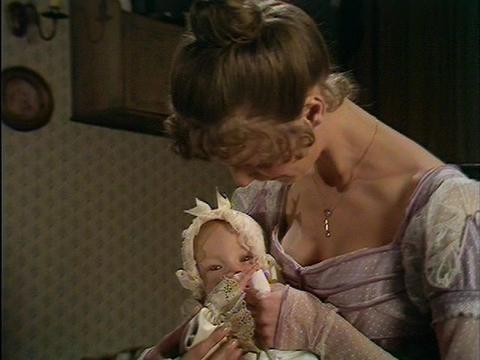
Emma (Doran Goodwin) fondling and nursing her sister’s baby
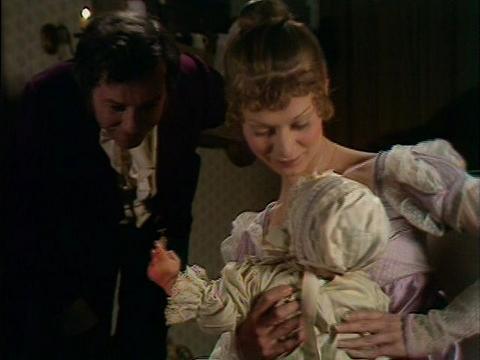
Mr Knightley (John Carson) comes to stand by, talk lovingly
They make up truly. They put the baby to bed and leave the darkened room in a comfortable natural relationship.
There is nothing so close or intimate between Davies’ lovers, but
he may remember this scene and has his couple linger over the child (downstairs though), and adds to the scene Mr Knightley reminding Emma of how he fondled her as a baby (not in the book at all) which leaves a curious note. The emphasis feels peculiar.
Sarah Caldwell’s book on Davies quotes Davies as saying there’s something “odd” or funny going on with Knightley and I think that careful attention to this film adaptation (instead of just sitting there cataloguing what is faithful literally and what not) would show this film is about the unconventional sexualities Davies thinks are in Emma, including Frank as capable of sadism and altogether too interested in Jane’s skin. I agree with Davies about Austen’s Frank but think Davies mistakes Austen’s intense affection for her brothers throughout her novels for a father-daughter queasiness in Emma.
Sylvia
--
Posted by: Ellen
* * *
Comment
- Knightley’s harshness with Emma was jarring. He was responding honestly to her blunders, but he was responding also, I feel, unconsciously to Mr Woodhouse’s controlling valetudenarianism. Mr Woodhouse is shown to be the villian, contributing to Emma’s delinquencies. All the real, longlasting actions and feelings in Sunday night’s Emma were amongst the men. Like you say, Emma has no inner spiritual life in the show and most likely never will. It’s as if Emma were being proposed as the UK’s Hannah Montana, their premier adolescent.
— Richard Mar 25, 1:47pm # - From Ursula on Austen-l:
“I did re-watch bits of it (I was channel-flipping because there was a very good documentary on Afghanistan on CBC at the same time).
I liked this EMMA better this time and noted a few nuances I’d missed the first time (12 years ago—ye gods!).
When we discussed this production on this list there was general agreement that Knightley was presented as very harsh, too scolding, perhaps too “old” for Emma. I think that this time I saw more mellow moments although he is presented somewhat ambiguously.
I was also struck by the gypsy scene. I had forgotten that Emma ran away and left poor Harriet. Unless (of course) we assume this to be some sort of dream sequence (which I think Arnie was suggesting a week or two ago).
I liked the Box Hill scene (an operatic ensemble finale) though I think the Paltrow version is better developed.
Frank Churchill came across much more as a slimeball for me this time! I can see in this portrayal why Austen predicted a grim future for Jane.
Harriet was very good—as were Jane Fairfax and Miss Bates (from Fawlty Towers!)—and Mr. Woodhouse was superb.”
— Elinor Mar 26, 12:24am # - Also from Austen-l:
“It was not Emma, but another friend of Harriet’s who ran away, which is the same as in the book. Only in the Miramax (Paltrow) adaptation is Emma with Harriet when she is frightened by the gypsies. In the 1972 version, Harriet’s friend has a name (Betty Bickerton vs. Miss Bickerton in the novel), whereas the friend has no name in the Davies version.”
— Elinor Mar 26, 12:25am # - From Maria on Austen-l:
“Well, once again, I can give a perspective from my father’s point of view: he didn’t know the story at all, but was happy to hear about another Austen adaptation coming along: “That one was a very intelligent woman,” he told me. “She understood the psychology very well.” So he looked forward to the broadcast, and enjoyed it very much (I did too, much better than I had the last time I saw it many moons ago). He found it funny and true: some characters and situations reminded him of childhood acquaintances in Spain. The tangle of who would get whom intrigued him. Also, he was very happy to watch Prunella Scales, a favorite of his from “Fawlty Towers” a show he (oddly) likes very much. He wasn’t sure about the casting of Mr. Knightley, perceiving him as “grumpy” most of the time. Jane Fairfax was referred to as “the pretty one”, and Harriet was “the little blonde girl”. The sense and feel of Highbury was clear to him as a town, but he was less clear on the standing and placement of the Woodhouse and Knightley families in relation to each other and to Highbury society and hierarchy. On the whole, though, he found the exposition clearer here than in other JA adaptations.
I think I’m going to look up some Spanish translations of JA and let him loose on them.
Maria”
— Elinor Mar 26, 12:26am # - I was unable to watch this version of Emma, however, I watched the 1972 version recently and thought the Emma / Mr. Knightly relationship was handled very sensitively. Thanks for writing this very interesting and perceptive essay, Ellen.
Clare
— Clare Shepherd Mar 26, 4:07am # - From Victoria on Janeites:
“I remembered from my previous watch of this Emma that I hadn’t cared for it particularly, but I could not remember why, so I decided to give it another go this past Sunday. Your review of it captures perfectly for me what was wrong with it: invented scenes at the expense of nuance, and a strangely fierce Mr. Knightley.
Victoria”
— Elinor Mar 26, 7:00am # - From Elissa on Janeites:
“Ellen and All,
To carry further the point you made on your blog about the portrayal of an “angry” and borderline emotionally abusive Mr. Knightley in the Davies’ Emma: To me, this [rather unappealing] Mr. Knightley appeared to overly enjoy the role of paternal “oversight” so much that it almost verged on the aberrant. As Emma delights in holding the plump Baby Emma on Christmas Eve, Mr. Knightley, also the child’s uncle, takes the 3-4 month baby from her; toward novel’s end, as he professes his love for her, he tells Emma he has loved her from when he first held her as a three-month-old baby. He scolds her three times [yes, she deserved it] using the same expression “badly done, Emma; badly done!” which induces puckering and tears in our heroine, who has been scolded like a naughty child. Yet it somehow does not feel like the classic “Victorian” view that Dickens might present. It is also interesting that he is not interested at all romantically in the alluring Jane, only Emma, whom he held as a child. There is something “unhealthy” here in how this man enjoys enfantilizing Emma that I find quite “offputting.”
Elissa”
— Elinor Mar 26, 7:01am # - From Nancy M, listowner & moderator of Janeites:
“I saw Emma on Sunday night. It will be replayed in Atlanta next Monday. It was a well cast, enjoyable movie. I did not find anything about it to excite either raves of appreciation or ravings of horror. Mr. Knightley’s hair was less than appealing but he was.
I found myself really disliking Frank Churchill. He was too smarmy. That might be because I knew about the secret engagment. Perhaps if I had not known this I would have taken him at face value. As usual the last speech in which he discusses Jane Fairfax in terms of her skin, her complexion, her neck make my skin crawl. It is really repulsive to me. I thought that when I first read the book and have not found any reason to change my mind about it. Everyone else discusses Jane’s accomplishments, or her nature, or her circumstances, Frank discusses her looks as though she were no more than skin and neck—a mere body. Jane Fairfax was more than a mere body to everyone else.
I have looked at the dances in the recent movies and notice how they mimic some animal courtship rituals. Davies, or someone , likes to have bare hands touching bare hands. The movie makers appear never to have heard of gloves except for outside wear and refuse to acknowledge that ladies and gentlemen wore gloves when they went out of the house and at dances. They wore different sorts of gloves at dances than when riding, of course, but they were always hatted and gloved when out of their own houses.
“”something odd going on with Knightley”
Davies is quoted by Sarah Caldwell in her book on his work as having said he thinks there’s “something odd going on with Knightley.”’
I did not get any nuances, again perhaps because I was not looking for any. He does treat Ema as though she were his little sister at times.
That reminds me, I wonder if most viewers were confused about the line about “we are not so much brother and sister …” as that is mnot at all explained in anyway. I do not think that the John Knightley’s relationship was to emma was made clear. When Emma was holding the baby and Knightly came up and took the child from her, he could have mentioned something about wanting to hold his niece or Nephew.
Nancy”
— Elinor Mar 26, 7:03am # - I have always thought (along with Strong himself, Roger Gard, and J. F. Burrows) that one of Mr. Knightley’s primary motivations is jealousy. I see his anger in the film not primarily as righteous fatherly indignation (though there is a bit of that), but desperate jealousy of a younger, more socially adept young man.
— ibmiller Mar 26, 2:55pm # - Dear Ian,
I’m not questioning the rationale for the anger and outbursts, but their intensity, nature, & physical violence. I hope not all males who feel jealous move into physical abuse and furious rage in the manner of Davies & Strong’s Mr Knightley. If so, women had better not marry.
A contrasting example would be the jealousy felt by Wentworth of Mr Eliot in the second half of Persuasion. In neither Austen’s book nor the two films thus far, does the character or actors erupt ferociously. Nor does Austen’s Mr Knightley or John Carson (in the 1972 Emma) The other 1996 Miramax Emma's Mr Knightley was played by Jeremy Northam (who played Randolph Henry Ashe in Possesion, a similar type to that envisaged by McGrath) is not of the apparently faithful type. McGrath's Mr Knightley is characterized somewhat differently, events are rearranged and changed to make a romantic sensibility film.
And there's another aspect here, which you ignore and Davies spoke of to Caldwell and others: an incestuous eroticism, in Davies' view something troubling going on here; Knightley's urge to domineer is made the product of something unhealthy.
Ellen
— Elinor Mar 30, 10:50pm #
commenting closed for this article
